
Features
Community
Contracting
In-Depth
Women in Manufacturing
Canada’s Top 10 Under 40
We’re celebrating our young leaders in architectural glass.
August 24, 2022 By Glass Canada Staff
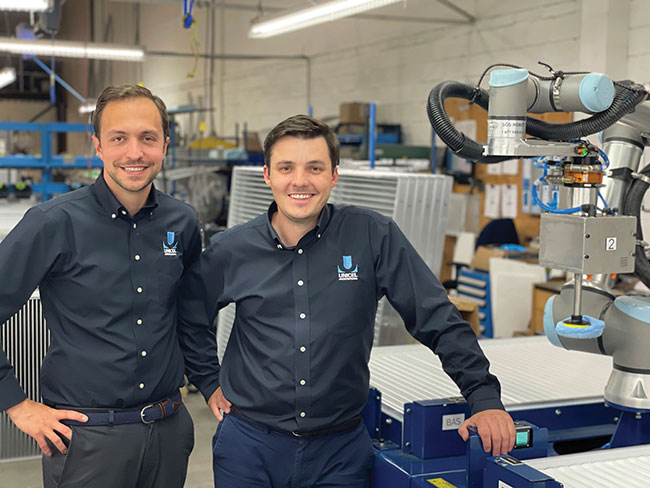 Sam at the left, and Vincent to the right, Unicel
Sam at the left, and Vincent to the right, Unicel They come from all walks of life and all levels of education. Someway, somehow, these 10 young professionals found themselves in the architectural glass industry. Many were raised in it – running around window-and-door shops as children, or working at their parents’ fabrication plants as a part-time job – but others stumbled upon the world of glazing by chance and discovered a unique quality and a compelling passion in the glazing community. Hailing from the plains of Manitoba to the chilly foot of the Laurentian Mountains in Blainville, Que., for the first time, Glass Canada is proud to celebrate 10 outstanding young people in the Canada’s glazing industry.
Step-brother duo
by Treena Hein
Curious, competitive, driven, fearless – these words best describe Vincent Couturier and Samuel Doyon-Bissonnette, who became co-presidents at Longueuil, Que.,-based Unicel Architectural in January 2022.
Started in 1964, Unicel Architectural has been transformed into a maker of unique glass, timber and aluminum products that are used in highly-specialized building projects in the U.S. and Canada. Couturier and Doyon-Bissonnette are continuing to lead the company in a time of explosive growth and innovation. They are stepbrothers who have known each other since childhood.
Couturier is a mechanical engineer and has always been entrepreneurial. During his degree, he completed three internships at Unicel Architectural, where his father was owner. He had also made Canada’s national fencing team and was competing at World Cups. “I was highly competitive and had a fearlessness to compete, to perform and get greater results than before,” he says. “That’s still a big part of me. Since I started full-time in 2015, every day I want to deliver better than expected. And to learn from mistakes. We have made mistakes, everyone does, but they are very valuable because you learn and grow from them. That philosophy comes directly from being a high-level athlete.”
Doyon-Bissonnette is also an engineer, civil in his case, and is driven to dig into problems at the same time he harnesses his natural urge to question conventional solutions. “I like to examine problems thoroughly and look at all the angles to get a thorough understanding,” he says. “I don’t generally accept the rules of thumb. I want to make new rules and find new solutions for problems. Challenges are what makes life interesting.”
Doyon-Bissonnette enrolled in a master’s degree at Concordia University in order to get a solid background on building envelopes (and Unicel Architectural has actually collaborated with engineers at that university over many years). “We find that the area of building envelope has been very open to change with lot of opportunities to innovate,” he says. “People were and are wanting to invest in new solutions, better insulation, new types of glass and many other exciting things, and that’s what draws me to it every day.”
Doyon-Bissonnette started out at Unicel Architectural as a project manager and then became director of engineering. Couturier started as a production engineer and became production manager. In 2020, they were in a meeting and looked at each other. It was time for them to do the buyout.
“We got the financing and it’s been full steam ahead,” says Couturier. “Following the acquisition of IC2 Technologies in 2018, we now have two plants, Longueuil and Portneuf, which allow us to adapt very fast and keep on developing new products,” he says. “We’re having a lot of growth right now. We have hired a PhD to head our R&D and we’re integrating photovoltaics into the business.”
“There is a huge demand for thermal technologies, for new products to meet the demands of tomorrow,” says Doyon-Bissonnette. “We are able to create highly customized solutions for designers and architects for unique projects all over North America. We are very specialized and we take pride that we can do projects that no one else can.”
Part-time to vice-president
by Treena Hein
 Employees at High Performance Glazing know they can count on their vice-president, Ameet Balilty, for many reasons. He’s always there for them, he shows appreciation for them and he knows the exact types of challenges they can face because he started on the shop floor. Balilty had worked part-time at Regal (HPG’s parent company, a window firm co-owned by his father) during high school and university, and when a job came up at HPG about 12 years ago, his father urged him to give it a chance.
Employees at High Performance Glazing know they can count on their vice-president, Ameet Balilty, for many reasons. He’s always there for them, he shows appreciation for them and he knows the exact types of challenges they can face because he started on the shop floor. Balilty had worked part-time at Regal (HPG’s parent company, a window firm co-owned by his father) during high school and university, and when a job came up at HPG about 12 years ago, his father urged him to give it a chance.
“I thought I’d have a career in computers, but I had liked the glazing industry, particularly the automation,” he says. “I cut glass, then did delivery, ran the tempering oven and then went into purchasing. Then I did two years as sales manager and about four years ago, became vice-president. It’s really good to know the whole process.”
During Balilty’s time as vice-president, the HPG plant footprint has doubled. Balilty has modified the entire plant layout to improve efficiency and added significant automation. Putting the skills needed for all that aside, Balilty also understands the value of those he leads. “My team is really great, from the office to the plant floor to the shippers,” he says. “You are only as good as your team. I hope that they enjoy working with me. We have a good atmosphere where we show our team regularly that we appreciate them. And we continue to grow and they are happy about that security.”
They also know that if something happens with a machine or an order, Balilty is always willing to do whatever needs to be done. He’s hopeful that in the next five years or so, he’ll be able to help design a second facility, taking HPG to new heights.
The 21-year summer job
by Daniel Reale-Chin
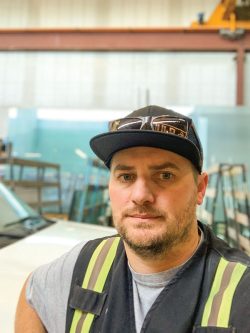 On July 3, 2001, Cameron Wright began his first day of work at Alpine Glass. “It was a Monday,” Wright recalls, “the week before I started – the day after I graduated highschool actually – I got a call from Norm Post, who was the manager of Alpine Glass at the time. My dad worked there at the time and told him I needed work for the summer.”
On July 3, 2001, Cameron Wright began his first day of work at Alpine Glass. “It was a Monday,” Wright recalls, “the week before I started – the day after I graduated highschool actually – I got a call from Norm Post, who was the manager of Alpine Glass at the time. My dad worked there at the time and told him I needed work for the summer.”
Wright’s father, Allan Wright, wanted his son to go to university in September, but for the summer father and son would work side-by-side and Allan would teach his son about the glazing industry. Twenty-one years later, Wright, now 38, is still at Alpine Glass employing 21 years of knowledge as the senior field superintendent and is now a partial owner of the company.
“My dad didn’t want me in the trade because he lived through the ‘80s and saw how hard the industry could be,” says Wright. In fact, Wright took his father’s advice and spent two years studying nuclear physics at the University of Calgary. “High schools have this bad habit of churning people to universities rather than the trades. But it wasn’t for me. As soon as I finished my second year, I decided to go back to Alpine full time,” says Wright.
His first full-time stint at Alpine was as a shop fabricator, a position that Wright spent three years in. “As a shop fabricator, I worked with two of the best guys in the industry, Brian and Travis Berends, who taught me everything they knew about glass fabrication,” says Wright.
After three years, Wright went on the road with Ken Lee, who he says was a very experienced service man. “I learned a lot of lessons selling with Lee,” says Wright, “but the biggest lesson was probably how to deal with people. I learned how to work with customers and manage their expectations. In the five years I spent traveling with him, I probably learned all there is to know about customer relations.”
In 2004, Wright started in the government of Alberta’s apprenticeship program at the Southern Alberta Institute of Technology and in 2008 got his journeyperson accreditation and Red Seal. After that, Wright got the keys to a truck and was given a partner to start running his own small projects. “By 2009, I was running some of our largest projects on the books,” says Wright.
“I don’t think I could have been successful in that position without some of the partners I worked with along the way, people like Dawari Miadonye, Skyler Swaim, Tayler Dalzell and Dave Beckner, who all helped in my own success,” says Wright.
In 2009, Wright started as the field superintendent at Alpine Glass and stepped into ownership in 2015. “My day-to-day tasks have evolved since then. Each day brings something new, but I start every morning the same: I walk the shop, see what material is out there, what material’s come in and see what the staff are working on. I go meet with each crew member daily and see if they need anything and then I sit down with the project managers to ensure they have everything they need to get their jobs done,” says Wright. With around 20 team members under him, Wright’s day can be very busy, but he values the people around him.
After managing people all day at Alpine, Wright goes home to spend time with his wife and his six-year-old daughter. He’s also very involved with Alpine’s summer league hockey team, with his local union (Local 177, District Council 17, IUPAT Glaziers) and runs a small honey farm with his cousin, Colin Wauthier, who also works at Alpine. “We produce around 600 pounds of honey a year,” says Wright.
The Sanders bunch
by Treena Hein
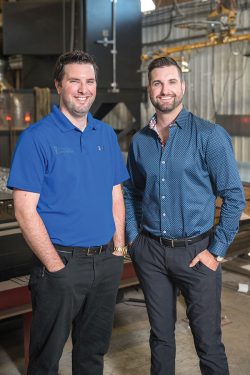 It’s no surprise, when you look at their drive to succeed, abilities and family values, that brothers Corey and Blake Sanders continue to lead Spandreltech to new heights. Corey is now vice-president of operations, and Blake vice-president of finance, at the company founded by their parents Irene and Wesley in 1991. Irene’s parents had immigrated from Germany and started a metal fabrication business, which soon expanded into panelling, backpans and more. In 1991 Irene and Wes created Spandreltech and the company now serves markets across North America.
It’s no surprise, when you look at their drive to succeed, abilities and family values, that brothers Corey and Blake Sanders continue to lead Spandreltech to new heights. Corey is now vice-president of operations, and Blake vice-president of finance, at the company founded by their parents Irene and Wesley in 1991. Irene’s parents had immigrated from Germany and started a metal fabrication business, which soon expanded into panelling, backpans and more. In 1991 Irene and Wes created Spandreltech and the company now serves markets across North America.
Corey was destined to join Spandreltech, as he has quite literally grown up in the shop. By 16, he worked at Spandreltech before and after school, on weekends and ran the night shift during the summers. “It has always been important to me that I know how to run every machine in our shop and our production
manager, Brian, has always encouraged that,” he says. “In high school I did a co-op at Spandreltech and learned CNC programming. This has been the most valuable skill I have ever learned, and I owe a great deal to our head programmer, Brad, for all he has taught me. While working towards my diploma, I worked remotely. Dad would email me drawings, I would do the DXF panel layouts and send them back.”
Blake enjoyed the business and worked on nights with Corey during high school. He studied kinesiology at university and had planned to make that a career – until third year. “I realized the opportunity I had that so many other people do not,” he says. “I’d learned ordering and business financing already and excelled in math in school, so finance was naturally a great fit for me.”
At that point, Blake knew the basics but still had a lot to learn. In 2014, when their parents were in a serious vehicle accident, Blake (20) and Corey (23) jumped right in. “We had to take the ball and run with it overnight,” says Blake. “We’d propped each other up. We knew we could count on each other and we still do. We both can and will do whatever it takes to get it done. That includes rolling up our sleeves and getting our hands dirty.”
During COVID their perseverance was again tested. “We were feeding nine assembly lines in North America,” says Corey. “We had many sleepless nights. We had employees and customers looking at us for answers, relying on us to know what to do next. Fortunately, several of our projects were medical facilities and we were declared an essential service.”
Corey and his wife Christina have two boys and Corey jokes that he already has a future brake-press operator and front office administration. Blake is engaged to Jessica and they are also planning for their future.
“We would not be where we are if it were not for the support we have had along the way,” they say. “Every accomplishment we have ever achieved needs to be shared with the remarkable team that has been assembled at Spandreltech.”
Window wizard
by Daniel Reale-Chin
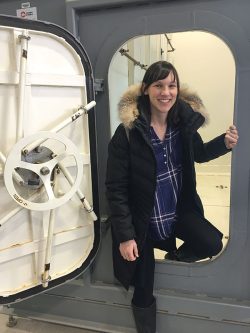 If there’s one thing that defines Aynsley Dueck it’s a passion for learning. After growing up around window and door displays in her father’s Winnipeg company, Duxton Windows and Doors, she moved to Vancouver to carve out a life of her own. It was in October 2012 that Dueck, 34, returned to the plains of Winnipeg and took her spot in the family business.
If there’s one thing that defines Aynsley Dueck it’s a passion for learning. After growing up around window and door displays in her father’s Winnipeg company, Duxton Windows and Doors, she moved to Vancouver to carve out a life of her own. It was in October 2012 that Dueck, 34, returned to the plains of Winnipeg and took her spot in the family business.
“I don’t think you should ever just work for your parents,” says Dueck. “I think you have to know what it’s like to not be related to your boss.”
In the 10 years that she’s been at Duxton, Dueck’s role has evolved from a position in marketing to her current position as operations manager. Since 2012, she’s leveraged the marketing skills she learned at the Art Institute of Vancouver and her business degree from the Asper School of Business at the University of Manitoba to grow Duxton’s presence in the fenestration industry.
From the start, Dueck knew she would have to take some punches when she came into construction. “When I started, my dad told me to tear down the website and do it again, tear down the showroom and do it again and I think that was really important because it taught me to speak the language of specifiers, of building envelope engineers and of homeowners.”
It’s that type of baptism by fire that Dueck says has shaped her into who she is. She learned from the bottom up, rebuilt systems and structures to better understand them and gained the depth of knowledge she needed to genuinely understand the science and design that goes into window manufacturing. An operations manager, Aynsley uses her penchant for detail to refine the manufacturing process. In fact, she says that her attention to detail is one of her greatest strengths in the business, “I know that it’s very easy to drown in the details if you’re not careful but I know just how much details matter in window manufacturing.”
Her meticulous nature and background in business led Dueck to studying the ways of Continuous Improvement and grasping the importance of Lean manufacturing. For the past six-plus years, Aynsley has played a sort of alchemist, using the principles of CI and Lean to fine-tune Duxton’s manufacturing processes, shave off redundant steps, reduce waste in the operations procedure and turn seconds of saved time on daily tasks into saved minutes over the year and saved dollars over the long-term.
“Early on, Aynsley quickly understood the critical importance of performance testing through lab and onsite testing and has been closely involved in that process,” says Al Dueck, Aynsley’s father and owner and president of Duxton.
Over time, Aynsley has gained a deep appreciation for working with her father. “He gives me the time that I need to be a mother, to be a wife and still be challenged here at Duxton,” she says.
When she’s not continuously improving the manufacturing process at work, Aynsley spends time with her son, decorates cakes and is also a huge soccer fan.
The dream team
by Daniel Reale-Chin
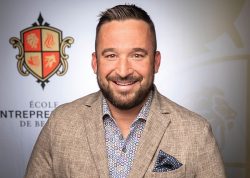 At 37, Jonathan Brosseau is a powerhouse. His titles are many including president, CEO and founder of Groupe Brosseau Vitrerie, as well as vice-president of the Quebec glass association, AVFQ. Now Brosseau is also pursuing an intensive entrepreneurship program at Ecole d’Entrepreneurship de Beauce.
At 37, Jonathan Brosseau is a powerhouse. His titles are many including president, CEO and founder of Groupe Brosseau Vitrerie, as well as vice-president of the Quebec glass association, AVFQ. Now Brosseau is also pursuing an intensive entrepreneurship program at Ecole d’Entrepreneurship de Beauce.
Despite his accolades, Brosseau retains a sort of humility, “I’m really happy for this nomination,” says Brosseau, “because it took a lot of hard work to get here. It also makes me realize that I’m still very young to be the leader of such a big company.”
Brossseau was even younger when he first started Groupe Brosseau in 2011, at the impressive age of 24.
“I started Groupe Brosseau after five years of working in glass installation for another company. I wanted it to be an innovative company with good values that focused on the well-being of its employees,” says Brosseau.
This year, the Blainville, Que.-based company was listed among the top 10 biggest employers in the glazing industry in Quebec – 11 years after Brosseau started it.
“The story behind Groupe Brosseau is a story of teamwork,” says Brosseau, who credits the people he surrounds himself with, their shared values and the company’s partner-suppliers with the steadfast growth of the company.
Brosseau’s humble beginnings in the glass industry started at 17. Before that, he says he was always surrounded by glaziers. “I have family that work in the industry on my mother’s side. What attracted me to the industry is how glass finalizes everything. Glass makes a building look complete, it really adds that wow-factor. Everybody is attracted to glass when they look at a building,” he says.
As for learning experiences, Brosseau says the biggest lesson he’s learned is the importance of relationships with clients and suppliers and staying up-to-date with what is happening in the industry. His role as vice-president of the AVFQ is something that’s also given him an ear-to-the-ground on industry happenings and trends.
“I got that role two years ago because I wanted to be more invested in the industry, to learn more about all the problems and the new practices in the hope to be able to transfer all of that information to my team,” says Brosseau.
His involvement with the industry is something that’s felt by the employees at Groupe Brosseau.
“Jonathan has a really big heart and gives everything he can offer to his team. He is appreciated by all,” says Vicnent Quessy, project director at Groupe Brosseau.
As Brosseau has grown into his position as leader, he’s made it a priority to give back to his community. He’s made it a goal to empower the younger generations in the glazing community and supports them with the scholarships he provides to students from Centre de Formation le Chantier and Study Center Professionnelles Saint-Jerome, two professional schools in Quebec.
As for down-time, Brosseau says he spends most of it sleeping.
From labour to glazier
by Daniel Reale-Chin
 Laura Little, 35, followed an unconventional path to glazing. From early on in her career journey, it’s clear she inherited her parents’ entrepreneurial spirit, using a university degree in developmental psychology to start her own business as a doula.
Laura Little, 35, followed an unconventional path to glazing. From early on in her career journey, it’s clear she inherited her parents’ entrepreneurial spirit, using a university degree in developmental psychology to start her own business as a doula.
After six years helping mothers give birth and couples start families, Little heeded the call home – back to the familial nest and the family business. In 2015, Little left the nativity scene and joined her family at Goldray Glass, where she grew up.
“As much as I tried to blaze my own trail I ended up back in the glass industry, which I’m so happy for,” says Little. Her parents started Goldray Glass in 1985 – a couple years before she was born – which Little’s thankful for, because otherwise, she says she would have never thought of a career in glass manufacturing. “I grew up in a glass factory, so I learned a lot by osmosis.”
Her formal career at Goldray began in marketing, where she nurtured the family brand and fostered its image as the marketing and communications manager. Nearly a decade later, Little recently assumed the position of vice-president of sales and marketing. “I stayed because I saw an industry full of genuine, supportive and good-quality people,” says Little.
In her new position, she’s busy. Our first call was interrupted by the sound of announcements over an airplane’s PA system. Laura was on a flight back from San Francisco, where she went to represent Goldray. Since joining, Little has promoted the brand across North America. She often travels across Canada and to the U.S. and spends her day solving problems and growing Goldray’s footprint. “We work with architects in the U.S. and Canada, so it’s my job to make sure we’re being true to who we are, no matter who we’re interacting with,” she says.
In the time she’s been at Goldray, Little has also seen interesting projects from thought to finish. One that stands out is Goldray’s installation at the Union Station bus terminal on Bay Street in Toronto. “It was the first big installation of our framed wall-cladding system. I got to watch the project being born from ideation to finish. The team was working with a new product and there were huge risks and headaches along the way, but watching the way my brother, the architects and the glazing-contractors solved problems together was fascinating.”
Despite the daily meetings, cross-border collaboration and the teams she manages, Little is able to retain a certain poise, even in the midst of voyage. She says her confidence is a quality she got from her mother, Cathie Saroka, who is executive chair at Goldray Glass. “She’s been in the glass industry since the ‘80s. Back then it wasn’t easy being a woman in the construction industry. She had to be confident, bold and an expert to get the respect that the men around her were given. At the same time, she retained her lovingness, her kindness and her patience.”
At home, Little does her own child-rearing, raising a family with two kids and a dog named Archie. In the future, Little says she wants to keep pushing the industry. She wants to make life easier for glazing contractors, grow the company and make Goldray Glass the recognized household name for decorative glass.
No. Why?
by Daniel Reale-Chin
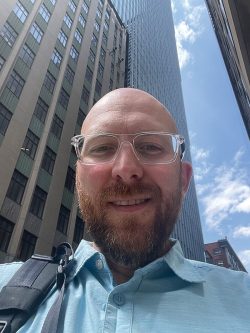 Ryan Spurgeon always imagined he’d become a doctor. He was following a straight path until he was 17 – to Dr. Spurgeon – until an accounting class in his final year of high school changed his trajectory from medical school, upended a couple of early-acceptance offers from multiple pre-med programs and started his impassioned pursuit of business.
Ryan Spurgeon always imagined he’d become a doctor. He was following a straight path until he was 17 – to Dr. Spurgeon – until an accounting class in his final year of high school changed his trajectory from medical school, upended a couple of early-acceptance offers from multiple pre-med programs and started his impassioned pursuit of business.
“There was something about the simplicity of accounting that made me fall in love,” says Spurgeon, now 34.
In February, 2005, while in his first year of university, Spurgeon found part-time work doing office jobs and accounting for Paul Brown, president of Barrie Metro Glass. At Barrie Metro, the accounting work was easy, according to Spurgeon, and what started as a part-time office job evolved into working in nearly every part of the back office, front office, manufacturing floor and eventually led to him being on the road, doing glazing installations. “We all start somewhere, but my journey started with installing shower doors with two hinges and a handle,” says Spurgeon.
Spurgeon spent his summers following Brown’s lead, doing installations for Barrie Metro on commercial projects. In the winter, he balanced a a full slate of classes in university with his office duties at Barrie Metro. While working there he learned the estimating, sales and project management aspects of the commercial glazing industry. “The four years I spent doing that were chaos, I made more mistakes than I want to admit, but I was always given the rope to learn,” says Spurgeon. “But those years and learning have done more for my career than anything I’ve done since.”
In fact, Spurgeon credits Brown, who encouraged him to learn to do everything himself, as one of the three greatest mentors in his career. “Working for a small family business forced me to learn every job in the trade. What I learned there was invaluable and something that I don’t think I would have been able to get in larger process-driven corporations where everyone has a defined role,” says Spurgeon.
The other two mentors are Steve Gusterson, vice-president of sales at Alumicor, who took his time to teach Spurgeon how to navigate the aluminum side of the industry and provided him introductions at every level of the industry, and Dan Muccelli, a manager (since retired) at ProTemp Glass, who he says taught him everything he knows about glass coatings, technology, limitations and capabilities. Spurgeon notes, “I just kept asking questions and they kept giving answers. Too often people are afraid to ask for fear of failure, but that’s part of being mentored – put yourself out there.”
Spurgeon started the next phase of his career at OldCastle Building Envelope in 2015, at the tender age of 27. “What pushed me toward OldCastle was their global locations and diverse portfolio of businesses. My wife and I watched too much Anthony Bourdain at the time, and I was sold on the idea that OldCastle/CRH could take my career around the world one day.”
In 2019, after a string of mergers and acquisitions, he found himself as the president of Antamex Industries, a title he currently holds. Since then, he’s worked hard to build Antamex’s business profile, repositioned it for the future as a modular-facade company with multiple product lines and works to expand the company’s footprint.
As a leader, Spurgeon prides himself on a philosophy of giving broad responsibilities, letting his staff surprise him with their outcomes. He pushes his team by answering their requests with “No. Why?”, encouraging them to advocate for their vision. He also maintains a Don’t Do It Again book, compiled of lessons he’s learned from his own failures, witnessed failures of others on his journey and fixes over the 17-years he’s spent in the glazing industry.
Despite the hiccups early on in his career, Spurgeon is passionate about the work he does and the industry he stumbled on.
“What sucked me in, what made me fall in love, were the bigger projects. They’re tangiable. You can drive around the city and say, ‘Look, I did that,’” he says.
When he’s not busy at work, Spurgeon spends time with his wife, Rebekah and sons, Xander, who’s 10 and Holden, who’s eight. He’s is an avid skier, coaches his sons’ lacrosse and sits on two charity boards. •
Print this page
The future of our industry is in good hands, great article!